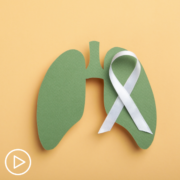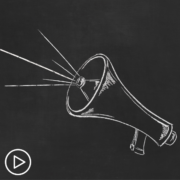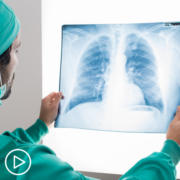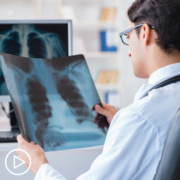Key Resources for Small Cell Lung Cancer Patients and Families
Key Resources for Small Cell Lung Cancer Patients and Families from Patient Empowerment Network on Vimeo.
What’s important for small cell lung cancer patients from underrepresented communities to know? Dr. Rafael Santana-Davila with the University of Washington School of Medicine shares advice for patient resources, his perspective about lung cancer stigma, and ways to mitigate issues with stigma.
[ACT]IVATION TIP
“…make sure that you ask your doctor, ‘Well, what about palliative care? What about social worker?’ or ‘I’m having trouble with this or that. Who can help me with this?’”
See More from [ACT]IVATED Small Cell Lung Cancer (SCLC)
Related Resources:

|

|

Advice for Small Cell Lung Cancer Patients Considering Clinical Trials |
Transcript:
Lisa Hatfield:
What key resources and support services do you typically recommend or provide to SCLC patients, particularly from underrepresented communities following their diagnosis?
Rafael Santana-Davila:
That is a good question that I don’t know the right answer to. So part of the resources that we share with the patient is a visit with a social worker, a visit with a nutritionist, a visit with our colleagues in palliative care, that they’re all part of treatment of the patient with cancer that is available both for patients of underrepresented communities or other patients.
So that is the activation tip for that is make sure that you ask your doctor, “Well, what about palliative care? What about social worker?” or “I’m having trouble with this or that. Who can help me with this?” And like we said before is a patient empowerment is…a patient that is empowered is a patient that asks all those questions and receives more help. There’s a lot of help that is out there and the key is to connect those individuals.
Lisa Hatfield:
What is your advice for a patient living with small cell lung cancer in rural areas who might not have access to state-of-the-art cancer care?
Rafael Santana-Davila:
Yes. So first of all, although people living in rural areas do not have access to major cancer centers…or let me rephrase that. They do not live in major cancer centers. Thanks to technology, they do have access. How? With telehealth. A lot of things that I do, which is medications, they don’t really have to see me for treatment. I can give advice on the treatment that can be instituted anywhere. So patients that live, again, in Eastern Washington, which is a rural part of the state, can see me through telehealth, and I can help them and their physicians who are not sub-specialists to direct their care.
And again, it’s important to know that it’s not that we’re smarter than the general community oncologists. We’re not. We just have more experience in this disease. We’ve seen a lot of things that happen, so we are able to recognize things when they happen and just have access to more clinical trials. So the activation tip for that question is make sure that…we said that before, that you seek a second opinion.
And that may not involve travel for many hours. That may be as simple as a telehealth appointment with a major cancer center of such state to know what is available. And also know that many clinical trials can now actually pay for lodging and pay for transportation to those centers. So although it’s going to be trickier for them to receive them, living in a rural area does not mean that you’re not eligible for that.
Lisa Hatfield:
Have you encountered any misconceptions or stigmas related to small cell lung cancer within underrepresented communities? And how do you address or mitigate these issues with your patients?
Rafael Santana-Davila:
There is a lot of stigma in this disease. We know that in the great majority of patients with small cell lung cancer and lung cancer in general, there is a smoking component to it. So patients feel that this is something that they brought upon themselves sometimes and there’s a lot of stigma associated with it. And that is not true. Yes, this is a smoking-related condition, but smoking is an addiction. Patients do not smoke because they want to. They smoke because they get addicted to it.
Everybody that I’ve met who’s a smoker at some point has wanted to quit and they cannot quit, not because they don’t have the willpower, or not because they’re weak, it’s because they can’t. This is an addiction. And it’s actually cancer, both small cell and lung cancer happens in the minority of smokers. So it’s important to know that this is…yes, quitting smoking could have prevented this cancer, but quitting smoking is nothing that is easy. And even if they quit smoking, this could have come.
So it’s important to patients to know that this is not…they should not blame themselves. This is both for underrepresented minorities and the patients at large. Don’t blame yourself for this. This is nothing that you could have prevented. And this is not your fault that this happened to you.” The activation tip for this is there’s a lot of what patients need to talk about, a lot of things, and these are hard conversations that you need to have. They’re not comfortable many times, but you need to open up. You need to have these conversations with your family, and you need to really say what’s in your heart. So that would be my activation tip.
Share Your Feedback:
Create your own user feedback survey






